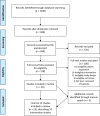Psychosocial modification of general self-efficacy in older adults: A restricted review
- PMID: 35235249
- PMCID: PMC9545063
- DOI: 10.1111/ajag.13052
Psychosocial modification of general self-efficacy in older adults: A restricted review
Abstract
Objectives: In recent years, the concept of general self-efficacy has increased in popularity. General self-efficacy is positively associated with quality of life and has the potential to act as a psychological buffer against adverse events and circumstances. However, due to the long-term influences that are said to shape general self-efficacy beliefs, they may be resistant to intervention, particularly within the older population. This restricted review aimed to explore whether psychosocial interventions could improve the general self-efficacy of older adults. Aspects of intervention design associated with improvements were also investigated.
Methods: A restricted review was undertaken. This included a keyword search of four major health databases (PubMed, CINAHL, PsycINFO and AgeLine). Search terms focused on general self-efficacy and the commonly used measures of this concept and were limited to the older adult population.
Results: In total, 848 articles were screened, with 20 studies proceeding to data extraction. The modification of general self-efficacy in older adults appears possible, with 7 out of the 20 included studies reporting improvements postintervention. Despite issues relating to the quality of included studies and the generalisability of their results, several aspects of intervention design coincided with intervention success, including intervention duration, and employing sufficiently-qualified staff.
Conclusions: Future research must address the generalisability issues identified in this review. Studies comparing the effectiveness of individual- and group-based interventions, the efficacy of remote delivery platforms and the possibility for long-term transfer of any improvements are needed to contribute the high-quality data required for policy and practice decisions in this area.
Keywords: healthy ageing; positive psychology; psychosocial intervention; self-efficacy.
© 2022 The Authors. Australasian Journal on Ageing published by John Wiley & Sons Australia, Ltd on behalf of AJA Inc’.
Conflict of interest statement
Prof. Yvonne Wells is an Associate Editor of
Figures
Similar articles
-
Beyond the black stump: rapid reviews of health research issues affecting regional, rural and remote Australia.Med J Aust. 2020 Dec;213 Suppl 11:S3-S32.e1. doi: 10.5694/mja2.50881. Med J Aust. 2020. PMID: 33314144
-
Behavioural modification interventions for medically unexplained symptoms in primary care: systematic reviews and economic evaluation.Health Technol Assess. 2020 Sep;24(46):1-490. doi: 10.3310/hta24460. Health Technol Assess. 2020. PMID: 32975190 Free PMC article.
-
Effectiveness of professional oral health care intervention on the oral health of residents with dementia in residential aged care facilities: a systematic review protocol.JBI Database System Rev Implement Rep. 2015 Oct;13(10):110-22. doi: 10.11124/jbisrir-2015-2330. JBI Database System Rev Implement Rep. 2015. PMID: 26571287
-
Behavioural interventions for type 2 diabetes: an evidence-based analysis.Ont Health Technol Assess Ser. 2009;9(21):1-45. Epub 2009 Oct 1. Ont Health Technol Assess Ser. 2009. PMID: 23074526 Free PMC article.
-
Psychological interventions for people with hemophilia.Cochrane Database Syst Rev. 2020 Mar 18;3(3):CD010215. doi: 10.1002/14651858.CD010215.pub2. Cochrane Database Syst Rev. 2020. PMID: 32187661 Free PMC article.
Cited by
-
Validity and reliability of the Chinese version of human-robot interaction self-efficacy scale in Chinese adults.Psicol Reflex Crit. 2024 Sep 26;37(1):40. doi: 10.1186/s41155-024-00324-z. Psicol Reflex Crit. 2024. PMID: 39325246 Free PMC article.
-
Effects of exercise-cognitive dual-task training on elderly patients with cognitive frailty and depression.World J Psychiatry. 2025 Apr 19;15(4):103827. doi: 10.5498/wjp.v15.i4.103827. eCollection 2025 Apr 19. World J Psychiatry. 2025. PMID: 40309604 Free PMC article.
-
The incidence and risk factors of phobic movement disorder after hip fracture internal fixation surgery.J Orthop Surg Res. 2025 Mar 29;20(1):323. doi: 10.1186/s13018-025-05750-y. J Orthop Surg Res. 2025. PMID: 40155931 Free PMC article.
-
General self-efficacy as a moderator between severity of menopausal symptoms and satisfaction with life in menopausal women.Front Public Health. 2024 Aug 29;12:1426191. doi: 10.3389/fpubh.2024.1426191. eCollection 2024. Front Public Health. 2024. PMID: 39267631 Free PMC article.
-
Analysis of the application effect of the Clark comfortable nursing approach in hemodialysis patients with end stage renal failure.Ren Fail. 2024 Dec;46(2):2423011. doi: 10.1080/0886022X.2024.2423011. Epub 2024 Nov 14. Ren Fail. 2024. PMID: 39540386 Free PMC article.
References
-
- United Nations . Global issues: Ageing. https://www.un.org/en/sections/issues‐depth/ageing/. Accessed July 6, 2021.
-
- World Health Organization . Noncommunicable diseases. https://www.who.int/news‐room/fact‐sheets/detail/noncommunicable‐diseases. Accessed October 10, 2021.
-
- Australian Institute of Health and Welfare . Older Australia at a glance: Healthy ageing. https://www.aihw.gov.au/reports/older‐people/older‐australia‐at‐a‐glance.... Accessed August 20, 2020.
-
- Public Health England . A consensus on healthy ageing. https://www.gov.uk/government/publications/healthy‐ageing‐consensus‐stat.... Accessed July 12, 2021.
-
- U.S. Department of Health & Human Services . Healthy aging. https://www.hhs.gov/aging/healthy‐aging/index.html. Accessed July 12, 2021.
Publication types
MeSH terms
Grants and funding
LinkOut - more resources
Full Text Sources


